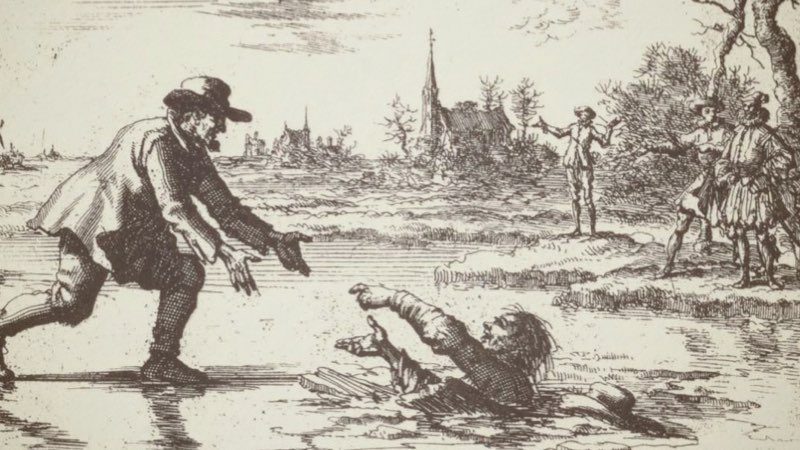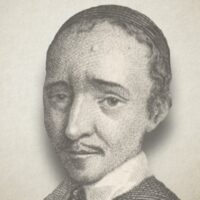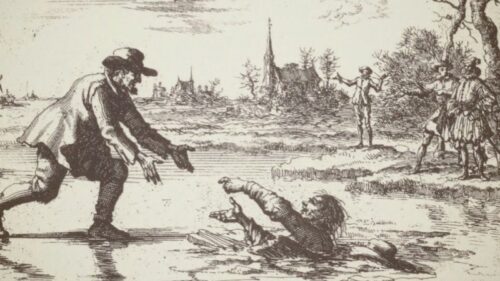
69. Justinus
Justinus, First Scourged, And Then Beheaded, For The Testimony Of Jesus Christ, A. D. 168
Justinus was called a son of Priscus Bacchus, and was born of Greek parents, at Neapolis in Palestine.
In its proper place we have spoken of the views of Justinus concerning baptism on faith, and have shown that he was sound and correct in them. Now, however, it is proper for us to speak of his spiritual birth, of his heavenly fatherland, and how conclusively he showed that he was a child of God, and a citizen of the heavenly city, filled with all good things; which appeared not only in the beginning and progress of his faith, but especially in the end, when he testified to its power with his death, and sealed it with his blood.
In the days of his youth he was instructed in the Platonic philosophy, in which he acquitted himself so meritoriously, that he received the name Philosopher, yea, he had been led to believe, that his learning would soon enable him to see God, which was the ultimate object of the Platonic philosophy. But it happened one day, as he was going toward the sea, in order to meditate in solitude upon what he had learned, that (as he himself has confessed) there followed him a very grave and gentle old man, who, having entered in a discourse with him, respecting the Platonic philosophy, taught him, in what true philosophy and happiness consisted, namely in the saving knowledge of the only, eternal, and alone immortal God.
Now, when Justinus inquired for the teachers from whom he might learn this divine philosophy, the old man referred him to the writings of the prophets, who did not write according to the argumentation of human reason, but, as certain and infallible witnesses, left behind what they had seen and heard of the words of truth, and the wonderful signs and works of God among His people; and that all their prophecies concerning the promised Messiah and Son of God, were fulfilled in the advent of Jesus Christ, who was born in the reign of Emperor Augustus. He therefore admonished him, to pray to God, that He would enlighten his heart to this saving doctrine, through Jesus Christ, without whom it would not be possible for him to attain to this saving knowledge.
“This and many more such discourses [writes Justinus] this old man had with me, showing me also, how I should further increase, and how I might obtain the things necessary to salvation. Then he went away, and I saw him no more. Immediately a burning desire was kindled in my heart, and a love for the Scriptures of the prophets and those men who had been dear friends of Christ, namely the apostles. Then only I became a true philosopher.”
As to how and by whom, beside the instruction of the aforesaid old man, he was first instructed and baptized, or from what cause he left his native land, and came from Syria, Palestine, or Samaria, to Rome, of this we find no account.
He afterwards had a disputation with Tryphon, a Jew. Of this he himself has written an account, in which may be seen his correct views in regard to different matters of faith, especially to baptism. Of this we have spoken in another place.
But finally, having entered into a controversy with Crescens, a Cynic philosopher, and having vanquished and confounded him, by the power of divine arguments, his uncertain life began to draw to a close, and his certain death to approach. For, by reason of this, this Cynic (that is, canine) philosopher, conceived such a deadly hatred for Justinus, that he swore to avenge it with his death; and from that time on did not cease to lay snares for him, and accuse him as a Christian, until he had quenched his thirst for blood with the blood of Justinus. This, Tatianus, the disciple of Justinus, gives to understand in his oration against the Greeks, in language not at all obscure, namely, that the above mentioned Crescens did not only seek the life of Justinus, but also that of himself. Moreover, Photius states that he tasted a joyful and worthy death, by the hands of Crescens Cynicus, the person whom we have just mentioned.
Touching the manner of his death: When Justinus had been apprehended, on the accusation of Crescens, and boldly refused to abandon his faith, or sacrifice to the gods, he was sentenced to death by Rusticus, the President, and, after having been scourged, he was beheaded with the ax, about A. D. 168, in the time of the reign of the Emperors Marcus Aurelius and Lucius Virus, and of the President Rusticus, as is annotated from Epiphanius. Cor. are Abr. Mell. 1st book of the Hist, der, fol. 37. 1-4, and jol. 38, col. 1-4, from Just. Apol. 2, pro. Christi., concerning his descent and name; Dialog, cum Tryphone Jod. Photius in Biblioth, mid Jos. Seal, animad. Chron. Eitseb., concerning his life and conversion; Iren., lib. 1, in Bibliotheca de Vita Justini Chron. Ens. A. D. 154, touching his end and death; Epiph. Hceres. 26 and 46 touching the time when this occurred. Also Gysii in Hist. Art. jol. 16, col. 3, 4. Also, P. J. Twisck, Chron. 2d book, for the year 154. page 42, col. 2, from Johan. Barl., fol. 7. Grond. bew, letter A.
Thieleman J. Van Braght (1625-1664) was an Anabaptist who is best known for writing a history of the Christian witness throughout the centuries entitled “The Bloody Theater or Martyrs Mirror of the Defenseless Christians who baptized only upon confession of faith, and who suffered and died for the testimony of Jesus, their Saviour, from the time of Christ to the year A.D. 1660” (1660).
Thieleman J. Van Braght, Martyrs Mirror




